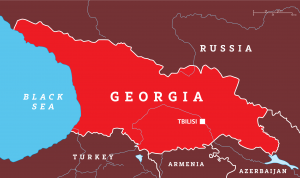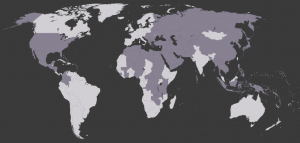GEORGIA PRESIDENTIAL ELECTIONS: DEMOCRATIC CREDENTIALS TAKE A HIT
Why It’s Important
 The victory of Georgian Dream-party candidate Salome Zurabishvili in a controversial presidential runoff election effectively consolidates the de facto authority of billionaire Bidzina Ivanishvili across all branches of government.
The victory of Georgian Dream-party candidate Salome Zurabishvili in a controversial presidential runoff election effectively consolidates the de facto authority of billionaire Bidzina Ivanishvili across all branches of government.
International election observers highlighted serious deficiencies and the country’s democratic credentials have taken a hit.
Though post-election protests have remained peaceful, prospects for political turbulence exist: the opposition is calling for annulment of the results, early legislative elections and proportional representation in Parliament.
Despite recent conciliatory gestures, any significant rapprochement with Russia remains highly unlikely at the present time.
Background
On 28 November, Salome Zurabishvili, the ruling-party Georgian Dream-backed candidate, was declared the winner of a controversial presidential run-off election. Zurabishvili, a former foreign minister, won 59 percent of the vote against (another) former foreign minister, Grigol Vashadze of the United National Movement who secured 41 percent of the vote. In the run-up to the election, it was considered an inconsequential affair: the President’s authority had been sharply reduced under a 2012 referendum and most significant (official) powers are now wielded by the prime minister. Unofficially, and perhaps more notably, significant influence and power remains in the hands of the country’s “informal leader”, billionaire and Georgian Dream founder Bidzina Ivanishvili. Without his support, any major political maneuvers or appointments are considered impossible.
Ivanishvili’s support to Zurabishivili came as something of a surprise: she suffered from limited popularity and relative obscurity. Her less-than-perfect command of Georgian (she was born in France to emigres who fled the Bolshevik Revolution in 1921 and only visited the country in 1986) and campaign gaffes may have also contributed to her failure to secure a first round victory.
Though Ivanishvili’s party made lavish promises to improve the economy and create jobs when Georgian Dream came to power in 2012, the country has had only achieved limited economic growth, mainly via tourism. This failure to significantly raise living standards and address the country’s wider economic woes were reflected in Zurabishvili’s failure to secure a win in the first round of the election, despite the ruling party’s expectations of a first round victory.
International Election Assessments: Free, But Not Fair
Since the dissolution of the Soviet Union, Georgia’s democratic processes have been held up as a relative success story and there were high expectations for these elections. However, a consortium of international election observers (led by OSCE/ODIHR) were atypically harsh in their assessment labeling the run-off free but not fair and stressing that “one side enjoyed an undue advantage”. The Head of the EU Parliament delegation noted cases of intimidation and pressure and observers cited widespread misuse of administrative resources by the ruling party (between the two electoral rounds). This included the write-off of about $600 million (1.5 billion Georgian Lari) in unsecured personal loans by banks – including a bank owned by Ivanishvili – that directly benefited some 600,000 citizens. All told, Georgia’s democratic credentials have taken a serious blow.
Opposition Refuses to Recognize Results
Citing fraud and irregularities reported by international observers, the opposition, led by Vashadze, has called for the election results to be annulled.
Several thousand people turned out on the streets of Tblisi for peaceful anti-government demonstrations on 2 December and another rally is planned for 16 December. In addition to the annulment of results, the opposition is calling for October 2020’s parliamentary elections to take place earlier, and a shift to proportional representation in Parliament whose 150 members are currently elected on the basis of single mandates. The opposition claims this structure excludes smaller parties and makes the system vulnerable to misuse of administrative resources.
Despite opposition protests and strong international observer critiques, key western leaders, including the Presidents of the European Council and European Commission, have already congratulated President-elect Zurabishvili. Their motivations may be purely pragmatic and informed by a desire to promote stability. The opposition campaign was also characterized by the outsized role played by former President Mikheil Saakashsvili, a political lightning rod. He enjoys a limited yet enthusiastic base of support in Georgia, but also makes impulsive and often bombastic statements which frequently overshadowed (and probably hurt) Vashadze’s campaign. Saakashvili’s statements likely informed the decision of the (third largest) opposition party European Georgia’, which won 10 percent of the vote in the first round and then threw its support behind Mr. Vashadze for the run-off, to avoid election protests.
What Next for Georgian Politics?
Ms. Zurabishvili’s victory leaves billionaire Ivanishvili as the de facto authority across all three branches of power. President-elect Zurabishvili is likely to remain beholden to her benefactor’s wishes, and Ivanishvili’s Georgian Dream party now presides over a super-majority in Parliament. The judiciary, which has low levels of trust among the general public, is commonly viewed as compliant to the wishes of the executive branch.
In an effort to further constrain Zurabishvili’s room for maneuver, the parliamentary budget committee announced on 4 December massive funding and personnel cuts to the presidency, effectively reducing the resources available to the office by roughly 50 percent. Zurabishvili, who also faced the prospect of dramatic staff reductions in Office of the President (from 140 to 60) was immediately quoted as saying she had no objections to the cuts.
Only Georgia’s still vibrant civil society – notoriously skeptical of state authority – remains a plausible political counterweight to the consolidation of power and influence in a central figure and single party. However, civil society has recently come under criticism from Ivanishvili’s government. Any future increase in government pressure will test the resolve and ability of civil society organizations and opposition media to sustain their independence. The current concentration of power is unusual in Georgian post-independence politics, and would seem to be a recipe for political turbulence, especially as 2020 parliamentary elections approach.
The State of Georgia-Russia Relations
Following the election, President-elect Zurabishvili cited occupation and formal recognition of the Georgian regions of Abkhazia and South Ossetia by Russia as logic for not seeking improved bilateral relations. Russia’s ongoing “borderization” – establishment of fences and encampments along the “administrative border” with South Ossetia – further dampens prospects for the re-establishment of diplomatic relations severed following the 2008 war.
In Moscow, however, some influential Russian figures, including the head of the Russian Senate’s Foreign Affairs Committee, have expressed cautious optimism about Zurabishvili’s election and implications for Moscow’s relationship with Tbilisi. Vague optimism may be nothing more than an expression of Moscow’s antipathy for Saakashvili and his involvement with Vashadze’s opposition campaign, Zurabishvili’s criticism of Saakashvili for his government’s 2008 armed confrontation with Russia, or perhaps Georgia’s recent detention of six Ukrainian nationals. Georgian authorities are holding the group, which allegedly battled Russian-backed rebels in Ukraine, on weapons charges. This can only please Moscow.
Although Ivanishvili has not been particularly vocal about his support of NATO and EU membership, Zurabishvili and Ivanishvili support accession to both. This position has outraged Moscow and is likely to continue to do so. Under these present circumstances, and given Zurabishvili’s limited room for independent maneuver, any dramatic improvement in relations with Russia remains unlikely.
Conclusion
In spite of the opposition’s allegations of electoral unfairness and calls for reform, near-term chances for heightened instability are relatively low. But the political situation remains tense and a serious misstep by the government or a significant triggering event could spark future disorder.

